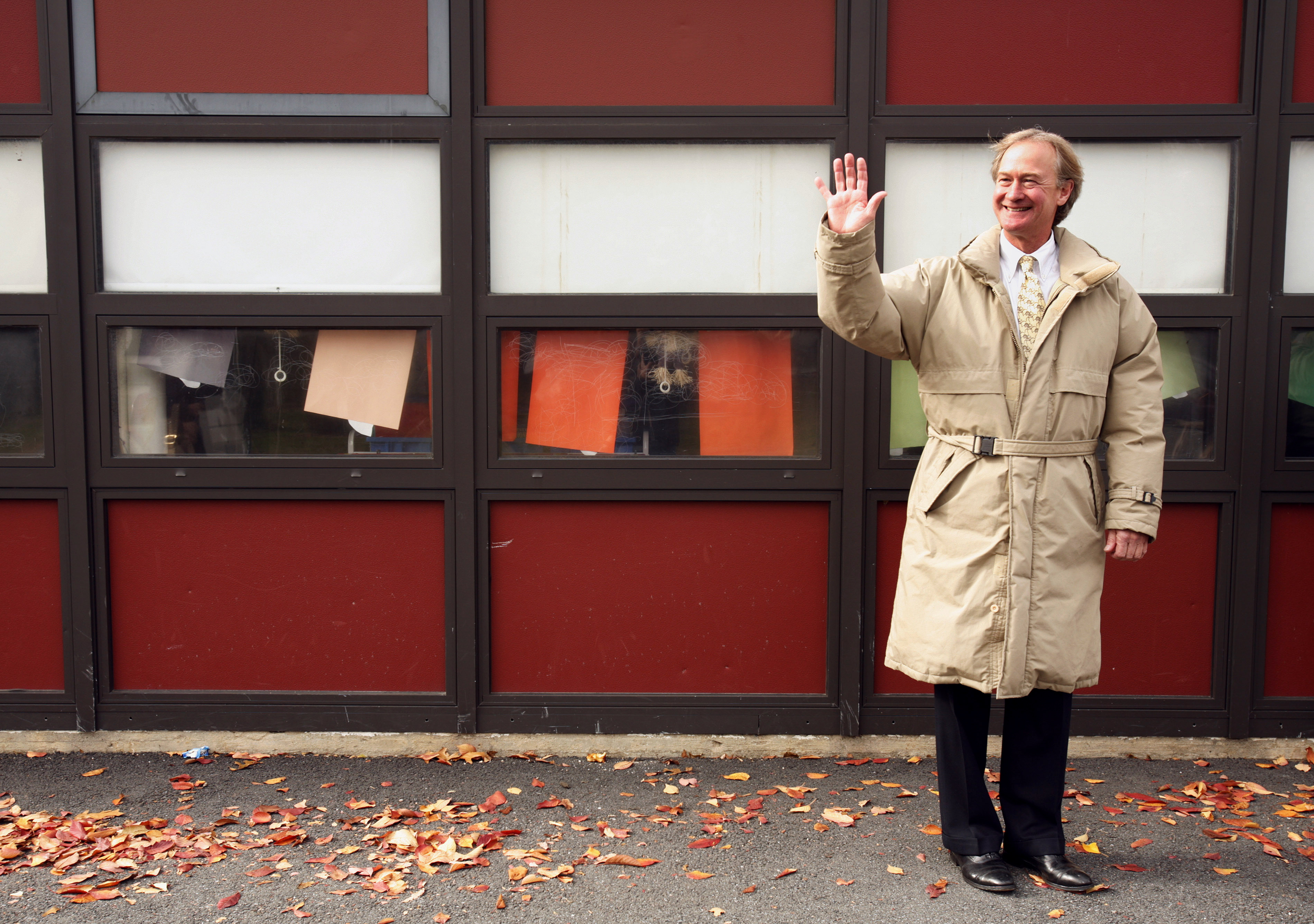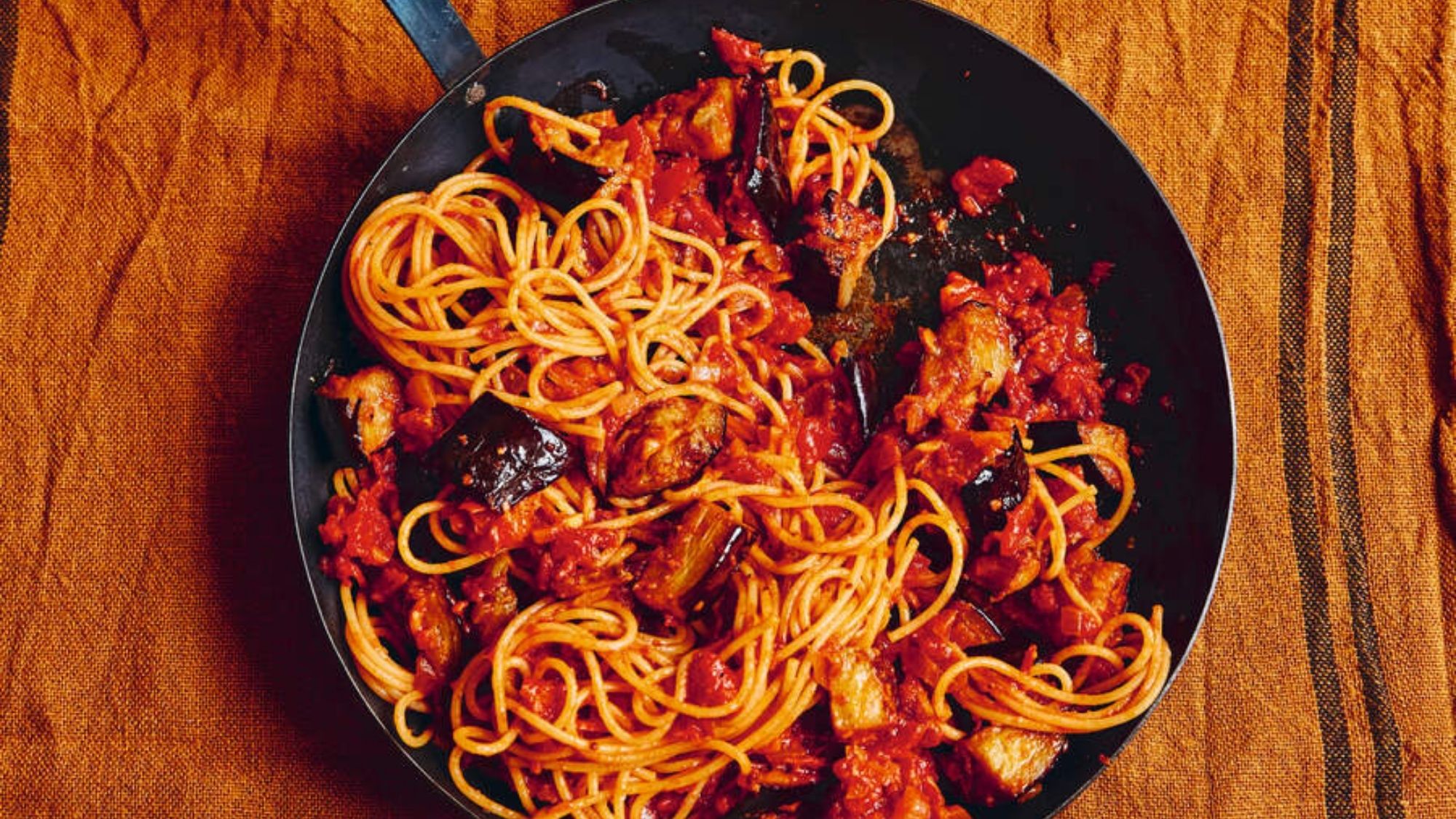Lincoln Chafee, last of the WASPs
A charming afternoon with Rhode Island's quixotic political holdover


"Did you come in from Providence?" Lincoln Chafee asks me.
We are about half a mile from the T.F. Green Airport, just around the corner from the Rhode Island Army National Guard and the Don Rodrigues Karate Academy ("HOME OF THE CHAMPIONS!") in a non-descript strip mall with an H&R Block, a Rent-a-Center, an IHOP, a Chipotle, a Dollar Tree, and Chafee's cozy office. It is a pleasant-looking, comfortably ramshackle affair, with a mix of antique furniture and randomly acquired kitsch. There does not appear to be a computer, and the television set is a small model with a built-in VHS player; one of the shelves is filled with hand-labeled videocassettes. Two of the lamps have shades with ducks on them. On the back wall beside a modest but obviously sturdy desk is a map of the United States and Canada shaded according to energy sources and usage.
Seated at a little table in the middle, wearing a denim shirt with a button-down collar, white chinos, and tasseled moccasins with no socks on what must be one of the rainiest days of the year, is the former governor and senator, a Brown University classics major and ferrier who spent seven years in the 1980s trimming hooves at racetracks before running for city council here in Warwick. He is beaming, and wants to make sure I'm looked after.
The Week
Escape your echo chamber. Get the facts behind the news, plus analysis from multiple perspectives.

Sign up for The Week's Free Newsletters
From our morning news briefing to a weekly Good News Newsletter, get the best of The Week delivered directly to your inbox.
From our morning news briefing to a weekly Good News Newsletter, get the best of The Week delivered directly to your inbox.
I explain to him that I took the Acela train up from Washington, D.C.
"Well, I can run you back up to Prov," he says, still smiling.
"I can do it," Debbie, his assistant, says insistently.
"No, I can."
A free daily email with the biggest news stories of the day – and the best features from TheWeek.com
"Please, I'll do it."
"Well, either, or we could both go."
"Let's fight over it."
But they don't, at least not yet. Instead Chafee asks me about my background, where I'm from ("Where were you raised?" is how he puts it), whether I "came east to school" (I did not), and how exactly I managed to fall into journalism. When I say that I would love my work if it were not for the cost of living in the D.C. area, he nods.
"All the big cities — New York, San Francisco, Boston — are unaffordable for regular kind of people," he says pensively.
The implication here, I suppose, is that unlike him I am very clearly one of those "regular kind of people." He doesn't emphasize it in a nasty or condescending way. But it's something he seems incapable of failing to notice.
"Linc," as he has been known to family, friends, and enemies since childhood, is the sexagenarian scion of one of Rhode Island's so-called Five Families, the Lippitts, Metcalfes, Goddards, Browns, and Chafees who from the Colonial era until the turn of the last century managed in one fashion or another to control the political and economic destiny of the Ocean State. The dynastic fortunes of the Chafees have been exhaustively, indeed exhaustingly, traced from the early 17th century up to 1909 by William Henry Chafee, who in his rare and admirable magnum opus The Chafee Genealogy notes that, in keeping with the vagaries of Yankee phonetics, the surname has since the family's arrival on this continent been spelled alternately Chafe, Chafee, Chafy, Chafie, Chafey, Chaphe, Chaffy, Chaffie, Chaffey, and Chaffee. The present form seems to have established itself firmly by the time of Dudley and G. Dexter Chafee in the early 20th century.
R.A. Wheeler of Stonington, Connecticut, has carried Henry's research much further, showing how Elizabeth Chaphe, the wife of Charles C. Morgan, was, by way of Louis I, Charles II, Louis II, Charles III, Louis IV, the Second Earl of Arundel, Lady Mabel d'Albini, Sir Hugh de Cailly, Lancelot Lake of Normanton and his wife, Catherine, Silas Holmes, and many, many others over the course of some 1,200 years, a descendent of Charlemagne and Hildegarde.
And today, we have Linc.
Lincoln Davenport Chafee was born in Providence in 1956 to John and Virginia (née Coates) Chafee. One of his favorite childhood memories is of running up and down an empty compartment with his brother on a train bound for the 1964 Republican National Convention in San Francisco. The boys were with their father, who was convinced that his party was about to nominate his fellow East Coast moderate Nelson Rockefeller. The party's eventual nominee was someone on whom little love was lost in the Chafee household. Barry Goldwater, Chafee Sr. said, "sounded like he was more concerned with being right than with winning."
The animus continues to this day. President Lyndon Johnson, "when he signed the Civil Rights Act — smart man — he signed away the South for the Democratic Party," says Chafee, who in 20 years of holding elected office as a Republican never once opened a copy of National Review. "Goldwater, a Republican, in '64 won six states down there.
"Because," he continues in a contemptuous faux-spooky whisper, "he voted against civil rights."
Chafee does not sound like a bitter man, but he is certainly a frustrated one, in the way that someone who has spent most of his adult life politically homeless can be. With Goldwater's nomination, libertarian economics gained a foothold in the Republican Party that it has never lost; two decades later what we now think of as social conservatism came into its own during the Reagan administration. By the time Chafee came to the Senate in 1999, filling the vacancy left by the death of his father, they were both relics.
Chafee sees his former party as a lost cause, given over to "fire breathers" and racists and cynics. He thinks most ordinary Republican voters are pulling the lever against their economic interests.
"Tax cuts for the wealthy!" he says, his voice screeching with high-pitched derision. "What is the average person thinking when they go to vote for someone who supports more tax cuts for the wealthiest Americans? The average person is gonna end up with a bill, but when the economy crashed millionaires still had their homes and their jets and still did fine."
How does he account for Republicans' continued political success, then? "You have to wonder if racism isn't in this conversation," he says. "I scratch my head at the return of the Republican Party starting in those oddball elections in New Jersey and Virginia [in 2009 gubernatorial elections] and Massachusetts — Ted Kennedy's seat! — and winning the House and finally winning the Senate. Was a lot of that fueled by having an African-American president? How do you explain the return to power of a party that got us into a totally unnecessary war in Iraq? Republicans were in power all those years before everybody lost their houses and lost their jobs, but they came back to power. How is that possible?"
Chafee also suggests more than once that it is "the social issues" that prevent working- and lower-middle-class people from voting for policies that would improve their well-being. I ask him what he thinks about the controversy that raged in the Democratic Party over Heath Mello, the pro-life Democratic mayoral candidate in Omaha, Nebraska, who lost despite an endorsement from and campaign appearances with Bernie Sanders after being virtually abandoned by the chairman of the DNC. Is it okay for candidates in his new party to oppose abortion and gay marriage? Could it actually help Democrats win races in places like Nebraska?
Linc takes a deep breath at first and pauses for nearly 10 seconds. "I would think that Sen. Sanders is right," he says finally. "Different points of view have to be welcome. Democrats have to start having a conversation on important issues. What does the average person want out of government? A better life for my children, so there's not this huge debt that's gonna cascade all around them. They want to be safe. I think post 9/11 there's still a — I call it the 'Fear and Anger Card,' which was played after 9/11. 'They're coming down Main Street tomorrow!' Come on. America's got the strongest military of the next 10 countries combined. We learned lessons from the Cold War. If you reach out to Mao Zedong, reach out to Gorbachev, good things happen. Talk about balancing the budget! That's where the money is. The old Willie Sutton line, 'Why rob banks? That's where the money is!' That's where the money is."
"The most important thing is the pocketbook issues," he says. "Be flexible in some of the other areas, social issues. What we really want our government to be doing is to keep us safe. Don't get us into unnecessary wars. Get us a surplus. Don't pass on our debt to our children. Get our roads and bridges, our Amtrak functioning properly."
He suggests that it was this unwavering focus on "the pocketbook issues" that made Sanders such a formidable opponent in the Democratic primary, in which Chafee briefly competed. "The crowds that Sen. Sanders would get during the campaign were just unbelievable," he says. "People would come from all over, and it was a mix of old hippies and idealistic millennials because he was an outsider — but he also had the experience of having been a mayor."
Linc starts tapping his desk.
"And having been a mayor, I know you have to pick up the garbage, you have to pick up the streets when it snows, you have to have the schools functioning, you have to have the police and fire responding when you call. He wasn't just a socialist or a dreamer. He could get things done. He was an excellent candidate in my view—"
He pauses.
"In this atmosphere of anti-elitism, of," pausing again and sneeringly slightly, "outsider thirst."
Here and elsewhere it is possible to detect beneath the caricature of Chafee as a gentle political naïf more than a hint of the old-time good-government Republican suspicious of the devious machinations of his newly adopted party and their amoral political machines. This is true not least in his discussion of the 2016 election and his erstwhile opponent Hillary Clinton. "The Clintons have been around a long time and they're near the DNC," he says. "It's not different here at the local level. If the state party wants somebody, the apparatus is going to run with them. But I just think she was a poor candidate. She just didn't appeal to the Rust Belt states. That's why I ran, to say, 'Let's give people a choice, this shouldn't be a coronation.'"
Did he ever think there was a chance for things to go differently?
"It was all rigged in the media," he says. "CNN had that debate. A farce. I do believe there was collaboration. The New York Times didn't even put it in the paper that I was running. I went through it again thinking, 'There's got to be a little blurb, a little box somewhere,' and so now we have Trump."
Despite his sunny demeanor — even when mocking his opponents or castigating half of the American voting public as racists happy to fall prey to demagogic appeals, a polite smile almost never leaves his face — Chafee does not strike me as very optimistic about the future of American politics. Fittingly for an old-school good-government New England reformer, it is the problem of money in politics that he thinks may spell our doom. His go-to example is single-payer health care. "You have to factor in the power of money," he says. "McCain-Feingold tried to do something about it, something that actually passed and was signed by the president. As long as you have the insurance companies donating gazillions of dollars and all those special interests, I think single payer, well, you have to back away from it. There's just too much money involved the cost of running these races in the House and the Senate and with Citizens United, it's unlimited. [Rhode Island ] Gov. [Gina] Raimondo is running ads now. She's not up till 2018, but there's a deluge of ads going up now."
When we are finished with our interview, he asks me again how I plan on getting back to the train station and suggests that I borrow an umbrella from him, an offer I politely decline after I point out that it will be impossible for me to return it, unless he would like me to send it back in the mail. On the ride question, once again he is insistent. So too is Debbie.
"No, it's fine," she says, "I'll take him." She also offers to take me to lunch.
"Fair enough then."
This is not the first fight that Lincoln Davenport Chafee has lost in his quixotic holdover of a political career. For his sake and the country's I hope it isn't his last.
Matthew Walther is a national correspondent at The Week. His work has also appeared in First Things, The Spectator of London, The Catholic Herald, National Review, and other publications. He is currently writing a biography of the Rev. Montague Summers. He is also a Robert Novak Journalism Fellow.
-
 Political cartoons for January 17
Political cartoons for January 17Cartoons Saturday’s political cartoons include hard hats, compliance, and more
-
 Ultimate pasta alla Norma
Ultimate pasta alla NormaThe Week Recommends White miso and eggplant enrich the flavour of this classic pasta dish
-
 Death in Minneapolis: a shooting dividing the US
Death in Minneapolis: a shooting dividing the USIn the Spotlight Federal response to Renee Good’s shooting suggest priority is ‘vilifying Trump’s perceived enemies rather than informing the public’
-
 The billionaires’ wealth tax: a catastrophe for California?
The billionaires’ wealth tax: a catastrophe for California?Talking Point Peter Thiel and Larry Page preparing to change state residency
-
 Bari Weiss’ ‘60 Minutes’ scandal is about more than one report
Bari Weiss’ ‘60 Minutes’ scandal is about more than one reportIN THE SPOTLIGHT By blocking an approved segment on a controversial prison holding US deportees in El Salvador, the editor-in-chief of CBS News has become the main story
-
 Has Zohran Mamdani shown the Democrats how to win again?
Has Zohran Mamdani shown the Democrats how to win again?Today’s Big Question New York City mayoral election touted as victory for left-wing populists but moderate centrist wins elsewhere present more complex path for Democratic Party
-
 Millions turn out for anti-Trump ‘No Kings’ rallies
Millions turn out for anti-Trump ‘No Kings’ ralliesSpeed Read An estimated 7 million people participated, 2 million more than at the first ‘No Kings’ protest in June
-
 Ghislaine Maxwell: angling for a Trump pardon
Ghislaine Maxwell: angling for a Trump pardonTalking Point Convicted sex trafficker's testimony could shed new light on president's links to Jeffrey Epstein
-
 The last words and final moments of 40 presidents
The last words and final moments of 40 presidentsThe Explainer Some are eloquent quotes worthy of the holders of the highest office in the nation, and others... aren't
-
 The JFK files: the truth at last?
The JFK files: the truth at last?In The Spotlight More than 64,000 previously classified documents relating the 1963 assassination of John F. Kennedy have been released by the Trump administration
-
 'Seriously, not literally': how should the world take Donald Trump?
'Seriously, not literally': how should the world take Donald Trump?Today's big question White House rhetoric and reality look likely to become increasingly blurred
